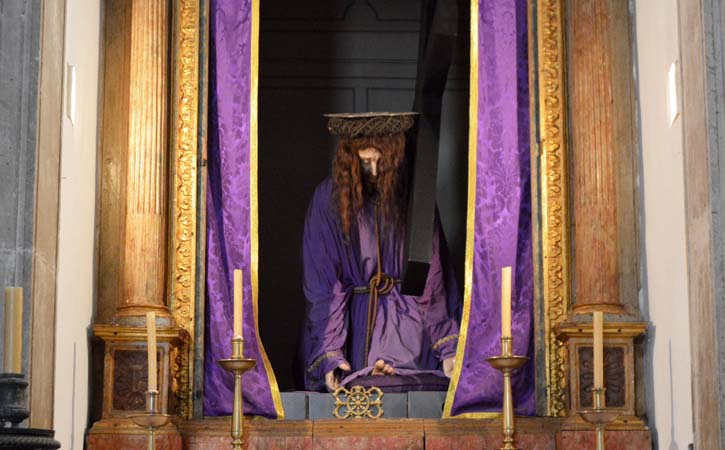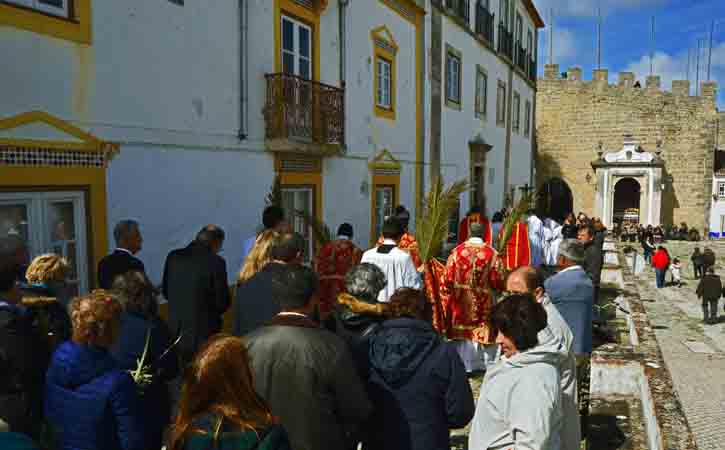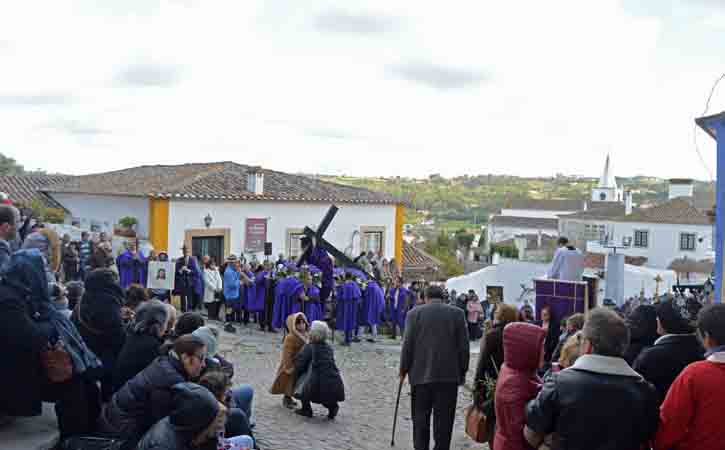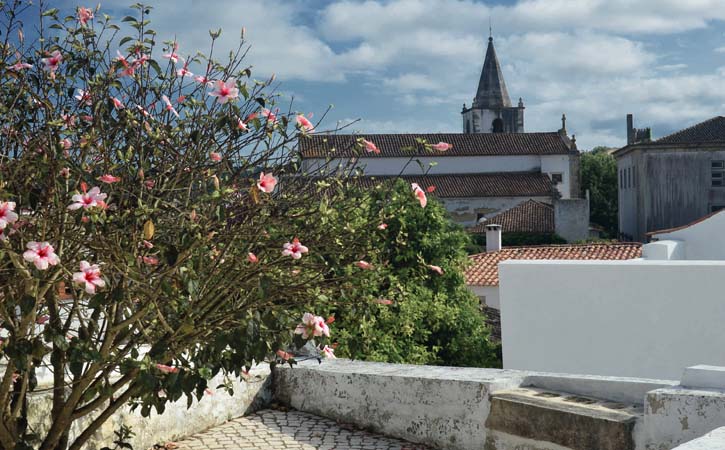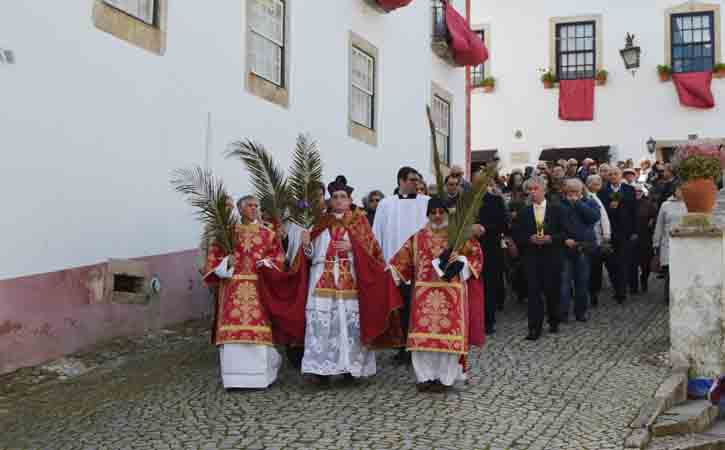Óbidos Holy Week: Visit us!
Óbidos Holy Week: Processions and lot´s more
The Óbidos Holy Week is part of the eventual events of the village.
Every year, religious and cultural ceremonies attract thousands of people at this time of year to the town of Óbidos.
Remember that these ceremonies are among the oldest in the country, with the Passos procession having more than 400 years of existence.
Therefore, Holy Week is the highlight of the Óbidos liturgical and cultural calendar, being an important religious event for the local community, as well as for the several thousand pilgrims and tourists who attend the imposing ceremonies.
As in other years, there will be several classical music concerts, essentially religious, among other cultural activities, which will be announced shortly.
The "Auto do Descente da Cruz" culminates with the moving Procession of the Burial of the Lord, held without any lighting, except for the torches that burn in the hands of young people who place themselves at key points in the processional journey. This ceremony, not being determined by the rubrics of the Roman Missal, was established in Portugal due to the devotion of the faithful in the 15th and early 16th centuries. As a cultural manifestation, it is considered the highlight of the ceremonies.
On Easter Sunday we attend the Eucharistic Procession, with the representations of the parishes and their places, and in which, in the sixties, it opened with the andor of the Risen Lord, a magnificent image that dates from the 17th century and was venerated in Church S . Tiago do Castelo. "
Just to say that our source is the official website of the event.
The History of Óbidos Holy Week
"Óbidos continues to be the stage for celebrations of historical and religious events. Evoking the Passion and death of Christ, Holy Week attracts many people to Óbidos, united by devotion or simply by cultural curiosity and religious tourism.
Awakening the greatest interest from a cultural and tourist point of view, Holy Week was early revealed as the best “poster” of Óbidos and undeniably the most beautiful and impressive religious ceremonies of its kind in the West. For this reason, in 1963, through the then Under Secretary of State for the Presidency of the Council, Dr. José Venâncio Paulo Rodrigues, these ceremonies were included in the tourist promotion program “Avril au Portugal”, assuming a dimension that was beginning to exceed country borders.
With the recent and gradual recovery of the Holy Week ceremonies, the Obidian community, from the age to the individuals, motivated and committed to maintaining traditions, has been able to collect and reflect on the testimonies that are transmitted from generation to generation, not only but also through photographs, writings and newspaper clippings. Much of the current knowledge of the traditional ceremonies in Óbidos was collected and is part of the private collection of Albino de Castro e Sousa (…) being his authorship the current version of the Auto do Descimento da Cruz, an ancestral tradition that dates back at least to mid-17th century.
This “poster” of Óbidos has its beginning in the realization of the secular Penitential Procession of the Third Order of S. Francisco, commonly known for the procession of young people, preparing the interior path of Lent. In this religious manifestation, parade nine exuberantly decorated with flowers, where some of the main saints of Franciscan devotion are displayed (almost all of these images date from 1849). It is not, after all, a folkloric revival, but a religious manifestation with deep roots and in which, once again, the invitation of St. Francis of Assisi to the participation of Christians in a community stripped of superfluous values, especially during of recollection, such as Lent.
On Palm Sunday, in an environment of olive, rosemary, rosemary and greenery on the floor, there is the majestic Procession of the Lord Jesus dos Passos, which runs through some tortuous streets, outside and inside the walls of Óbidos, stopping by small evocative of Passos da Paixão, culminating in the Church of Misericórdia, where it is customary to find a Calvary armed, representing the Mountain of Palestine, near Jerusalem where Jesus suffered the crucifixion.
This procession is opened by a traditional figure, the “gafaú”, who walks barefoot, with his head wrapped in a cloth and carries a musical instrument, known as “serpentão”. This figure represents the executioner, who walks in front of the procession that accompanies the condemned person, announcing to the crowd that his approach is coming very soon"
How to Get to Obidos
The best way to get to Óbidos is to take the A8 motorway that connects the cities of Lisbon to Leiria.
If you decide not to come by car you can always choose Rede Expressos from Sete Rios or Rodoviária do Oeste in Campo Grande.
Another option is to come by train, the views are more open but it takes three times longer to arrive, and the Óbidos train station is still far from the center of the village.
Obidos Annual Events
The Óbidos Holy Week marks the Easter festivities without a shadow, but during the year the town dresses up to offer a range of events that complement the entertainment in the municipality.
Óbidos International Chocolate and Pastry Festival
TheÓbidos International Chocolate and Pastry Festial (pastry appears as a complement to the event in the year 2020) arrives in the months of April and May, and brings to the village chocolate from all over the world.
In various ways and flavors, anything goes to draw the attention of so-called chocolate lovers ".
Óbidos Medieval Market
The months of July and August bring meditative times to the village. There are thousands of participants who dress up in their costumes and walk through the narrow streets such as Queens and Kings during the Medieval Market in Óbidos.
This festival, one of the largest in Portugal, is also distinguished by its playful part where there is no shortage of entertainment, including music or various shows.
The pubs you can find all over the place with delicacies almost always linked to pork are always something to consider.
FOLIO
FOLIO is a literary festival and the last to enter the list of annual events in the village of Óbidos. This is the only event that spreads throughout the village and has a little bit of everything: bookstores, exhibitions, colloquia, book presentations and always has national and international authors.
Óbidos Christmas Village
Óbidos Christmas Village is an event of national reference. Clearly organized for children, adults always end up having experiences that bring them back to the past.

